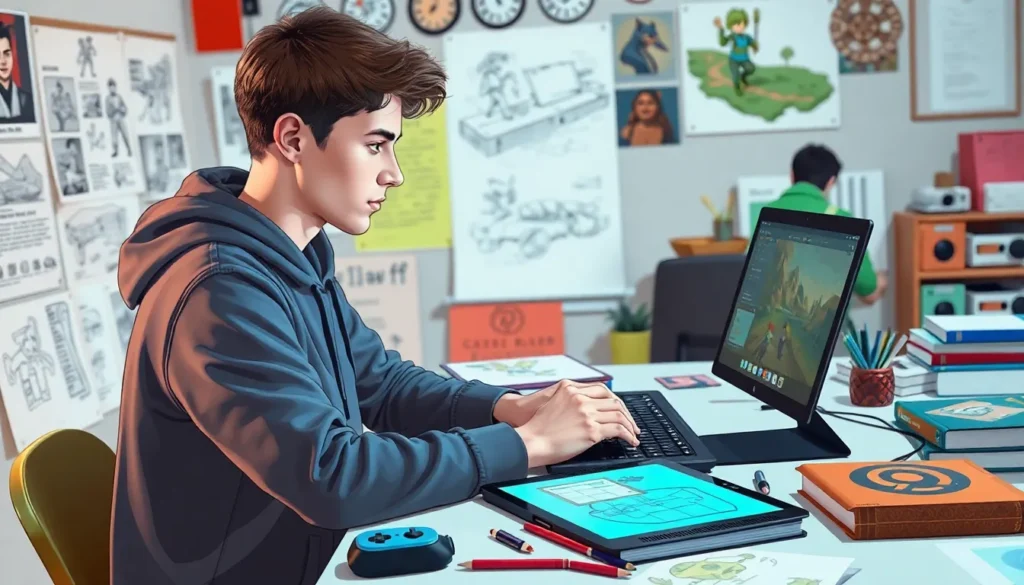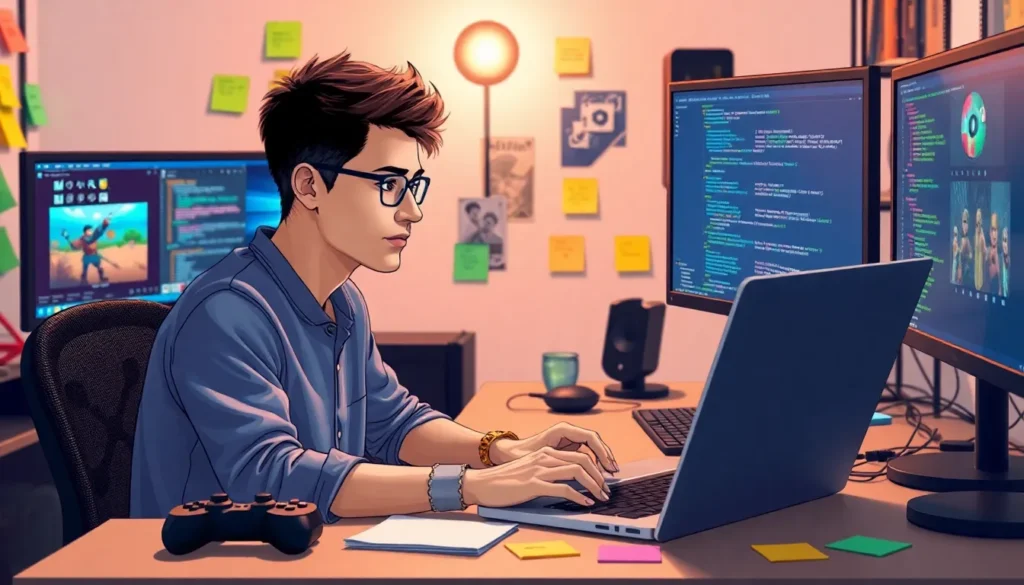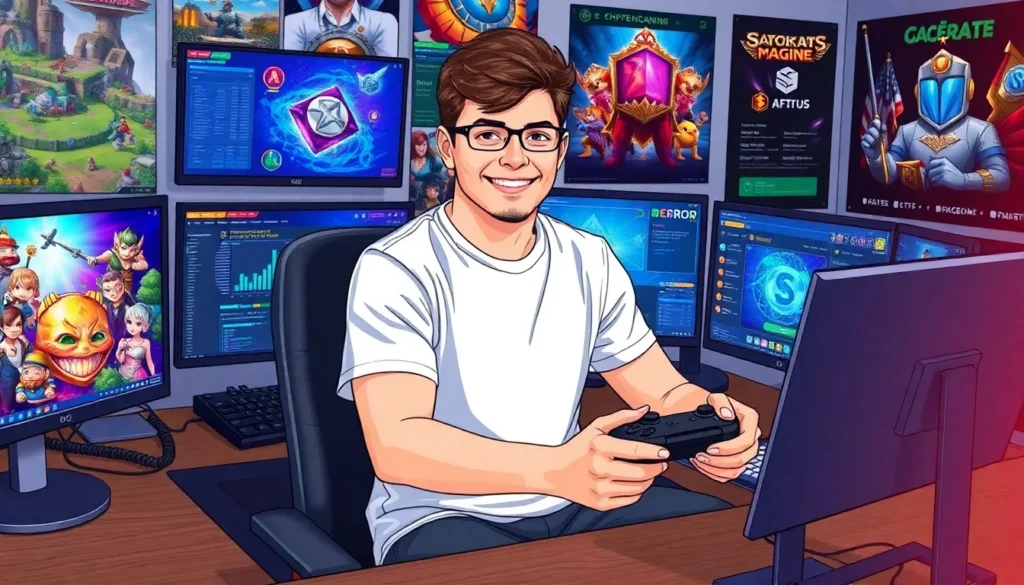Ever dreamt of creating the next blockbuster game that’ll have players glued to their screens? Well, it’s time to turn that dream into reality. Game development might sound like a daunting quest, but it’s more accessible than you think. With just a sprinkle of creativity and a dash of determination, anyone can embark on this exciting adventure.
Understanding Game Development
Game development involves creating engaging interactive experiences for players. This process encompasses multiple stages, from conceptualization to final testing and release.
What Is Game Development?
Game development is the art and science of designing video games. It includes several disciplines such as programming, art design, sound engineering, and game design. Developers brainstorm ideas, create storylines, and build game mechanics while ensuring enjoyable gameplay. They often work in teams, utilizing various tools and software. Collaboration among artists, programmers, and designers enhances the final product, delivering refined gaming experiences.
The Different Types of Games
Game types vary widely in style and execution, catering to diverse player preferences. Action games prioritize fast-paced gameplay and physical challenges. Puzzle games focus on problem-solving elements, often requiring logic and strategy. Role-playing games immerse players in rich narratives, allowing character progression and storytelling. Simulation games replicate real-life experiences, providing players with realistic interactions. Each type attracts specific audiences, influencing development choices and gaming trends.
Essential Skills for Game Development

Game development requires a mix of technical and creative skills. Aspiring developers need to focus on several key areas to enhance their capabilities.
Programming Languages to Learn
C++ remains a primary choice for game development due to its performance efficiency. C# serves as another essential language, especially in the Unity game engine. JavaScript is critical for web-based games, while Python offers ease in prototyping and script development. Understanding these languages helps developers create complex game mechanics and responsive gameplay functionalities. Additionally, familiarity with SQL for database management can aid in managing game data effectively.
Game Design Principles
Strong game design principles create engaging experiences. Mechanics involve rules and systems that define gameplay. Developing a captivating storyline enhances player immersion. Balance ensures fair play, while progression keeps players motivated. User interface design focuses on accessibility and visual appeal, impacting player interaction. Testing is vital for identifying bugs and refining gameplay. Learning these principles contributes to producing enjoyable and memorable games.
Tools and Software for Game Development
Game development requires specific tools and software tailored to various tasks. Choosing the right platforms simplifies the process and enhances creativity.
Game Engines Overview
Game engines serve as the backbone for game development. Unity offers versatility and supports 2D and 3D games, making it popular among developers. Unreal Engine features high-fidelity graphics, ideal for immersive experiences. CryEngine excels in realistic environments, while Godot provides a robust open-source option. Selecting a game engine hinges on project requirements, such as visual fidelity and platform compatibility.
Graphic and Sound Design Tools
Graphic design tools enhance visual elements in games. Adobe Photoshop enables pixel-perfect graphics and textures. Blender offers comprehensive 3D modeling capabilities, suitable for creating characters and environments. For sound design, software like Audacity provides editing and mixing options for audio assets. FMOD integrates audio for dynamic soundscapes, enriching gameplay experiences. Utilizing these tools elevates a game’s aesthetic and auditory impact, crucial for player engagement.
Steps to Start Game Development
Game development requires a structured approach. Following specific steps can streamline the process and increase the chances of building a successful game.
Choosing Your Game Concept
Identifying a unique game concept lays the foundation for development. Consider the target audience, genre, and gameplay mechanics. Explore various themes, such as adventure, horror, or simulation. Sketch out initial ideas and create a one-page game design document to outline core elements. Research existing games to assess market trends and find inspiration. Ultimately, selecting a compelling concept increases engagement and excitement for potential players.
Developing a Game Prototype
A game prototype serves as a preliminary version of the final product. Start with rapid iterations to test core mechanics and gameplay loops. Use simple graphics or placeholders while focusing on functionality. Create a playable version that showcases the main features and objectives. Gather feedback from playtesters to refine the game experience. Prioritize elements that enhance user experience and make necessary adjustments based on player input. This phase provides valuable insights, guiding the development toward a polished final product.
Building a Game Development Portfolio
Creating a strong game development portfolio showcases skills and attracts potential employers or collaborators in the industry.
Showcasing Your Projects
Highlighting completed projects demonstrates technical expertise and creativity. Include a variety of games to illustrate versatility, whether they are small prototypes or larger titles. Providing gameplay videos and screenshots adds visual appeal. Each project description should detail the role in the development process, tools used, and any challenges overcome. Sharing source code on platforms like GitHub allows for further insight into programming skills. Engaging storytelling elements can enhance the portfolio, making it memorable for viewers.
Networking in the Game Development Community
Connecting with fellow developers and industry professionals fosters growth and collaboration. Attending game development events, conferences, and local meetups builds valuable relationships. Online platforms like Discord, Reddit, and game development forums offer opportunities to exchange ideas and get feedback. Joining groups on LinkedIn helps maintain a professional presence and access job postings. Collaborating on game jams encourages skill enhancement while meeting new people. Networking can lead to mentorship opportunities, providing guidance and support throughout a developer’s journey.
Conclusion
Starting a journey in game development opens up a world of creativity and innovation. With the right mix of technical skills and artistic vision anyone can transform their ideas into engaging gaming experiences. Embracing the challenges and learning from each step will pave the way for growth and success.
Building a strong portfolio and actively engaging with the community can lead to invaluable connections and opportunities. As aspiring developers take their first steps they should remember that persistence and passion are key. Every game created is a chance to learn and improve. The adventure in game development is just beginning and it promises to be an exciting one.



